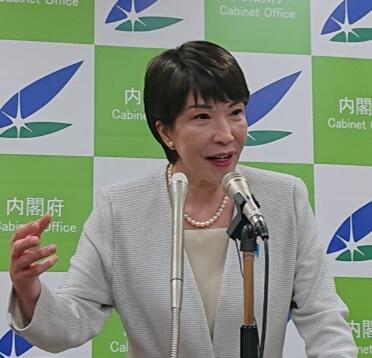We are at a critical point to see whether basic research, research infrastructure and talent development will be included as major pillars in the third phase of the Government's Healthcare Policy and the Research and Development Promotion Plan that will be implemented from next April. This is because the draft policy for strategy formulation presented by the government's expert study group contains almost no description of these issues; although the participating experts have raised a number of objections, they have yet to be corrected. Sanae Takaichi, Minister of State for Healthcare Policy, said, "Basic research, talent development and research infrastructure are cornerstones, and the government will provide active support to them," adding, "we would like to deepen our discussions with the advisors and committee members as well."

In the current second phase of the Healthcare Policy, the following topics are clearly positioned as basic policies and specific measures: consistent R&D from basic to practical application with AMED at the core and an improved R&D environment in collaboration with scientific research grants and in-house research. In addition, the Medical Research and Development Promotion Plan encompasses six integrated projects, including the Basic Disease Research Project and the Project for Seeds Development and Research Base, and clearly positions talent development and an improved R&D environment as key measures. Meanwhile, the draft policy for strategy formulation presented at the April 24 advisory meeting of the Headquarters for Healthcare Policy focused on five areas of drug and medical device development, including the strengthening of innovation and clinical trials; however, strengthening of basic research and research infrastructure and talent development were not included as pillars of the Policy.
At the advisory meeting, a range of related opinions were expressed. Advisor Hiroaki Ueno, President of the Japan Pharmaceutical Manufacturers Association (JPMA), said, "We need a system that allows us to attempt a large number of basic research projects, even if they cost a small amount, to turn zero into one. I would like to see Japan revive basic research, which serves as the source of competitiveness." Advisor Noriko Osumi (Vice President of Tohoku University) said, "The construction of a data platform and open access are the two key aspects of improving Japan's research capabilities. Infrastructure development for data utilization is a challenge." Advisor Hitoshi Nakagama (President of the National Cancer Center) stated, "Basic data infrastructure and acceleration and enhancement of basic research are important elements. As Japan's share of medical papers is declining, it is important to gain a firm footing. We hope that the aforementioned important elements will be the first thing to be addressed in the descriptions on the direction of the Policy."
However, when the same material was presented at the May 7 meeting of the Expert Committee on the Promotion of Healthcare Policy, various committee members expressed points of dissatisfaction. Committee Member Shigeo Koyasu (President of QST) said, "The foundations, infrastructure and talent that have been discussed in the study group are missing from the pillars. Basic research in the life sciences is critically important for generating the seeds of future research, and it is important to build a solid research infrastructure, including large-scale research facilities and databases, and properly nurture the talent to support this infrastructure." Committee Member Rami Suzuki (President, ARC Therapies Inc., a venture company originating from the National Cancer Center) stated, "From the viewpoint of industry, the three are directly related: fundamentals, infrastructure and talent. Investments in these areas can yield greater international competitiveness and international collaboration. It would be good to thoroughly embed this in the document in the future." Committee Member Masayuki Amagai (Permanent Director and Professor, Faculty of Medicine, Keio University) said, "The balance between mission-oriented and curiosity-driven is important. However, the mindset oriented towards basic research in the medical field is declining. There is concern that the direction may be very mistaken in terms of future health and medical care strategies." Committee Member Mayumi Shikano (Professor, Faculty of Pharmaceutical Sciences, Tokyo University of Science) stated that, "Many points have been made about nurturing talent for more than 10 years, but no progress has been made. We should also consider including projects that specialize in talent development."
There is a lack of basic research, talent development and research infrastructure not only in life science but also in health/medical-related fields. However, the government decided more than 10 years ago to strengthen one area, health and medicine, launching AMED and increasing related budgets for this purpose. The implementation of the second phase of the Healthcare Policy has produced results that have led to the development of new drugs and treatments. If Japan neglects the fundamentals and infrastructure here, we will lose not only the accumulated results we have built up so far but also the source of Japan's competitiveness 10−20 years from now. How this will be incorporated into the third phase of the Healthcare Policy and the Research and Development Promotion Plan remains to be seen.
This article has been translated by JST with permission from The Science News Ltd. (https://sci-news.co.jp/). Unauthorized reproduction of the article and photographs is prohibited.




